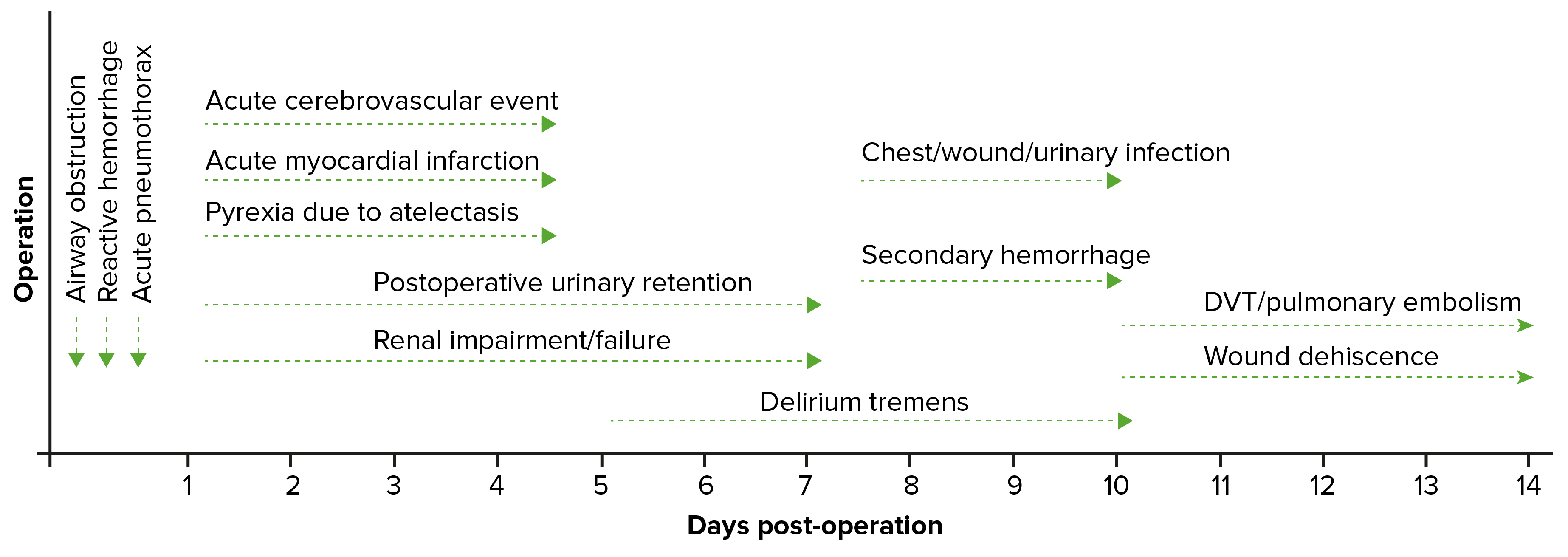Playlist
Show Playlist
Hide Playlist
Trauma and Post-OP Management: Scenario 2
00:01 Okay, head injury this comes up, pretty much every scenario, every exam will have something on head injury. 00:08 So standard scenario, bruising of the left side of face, faded the hemi-pelvis, parallel region, drop in GCS, high potency. 00:21 Okay? What are causes of reduced GCS? One is head injury, fine. 00:28 Anything else? Shock? Yeah, very good. 00:32 I truly, did morphine you mean. 00:35 Okay? Yeah, take that. 00:38 Hypoxia. 00:41 Alcohol? Yeah, you're right. 00:44 That will be there, but these are the common ones, the important ones, head injury, subdural, extradural, shock, hypoxia, due to respiratory depression, due to a head injury, facial fractures, pneumothorax, haemothorax, flail chest, your opiates as well, fine. 01:02 Why is a patient drowsy in an any situation, in an any? Alcohol. 01:09 Okay. 01:10 Drugs, very good. 01:11 So, hypoglycemia is a common stone then alcohol, drugs and again opiate overdose. 01:17 Okay? Now, make sure that in the exam, always remember hypoxia and hypoglycemia. 01:25 Sometimes, they ask what is the single most common thing? What is the most.. 01:28 What is the most likely cause of confusion? Certainly, we know we always think of slightly more complex things but they're asking hypoglycemia, it is so common. 01:37 In a post operative patient as well, hypoglycemia is one of the commonest cause of confusion. 01:44 Okay, indications for CT in an adult. 01:47 So starting indications, that's based on the NICE guidelines and this is what is asked the exam as well. 01:56 Pretty much logical things, I don't think there is anything which is not logical, you know, if you just look at it, you'll understand, there's nothing you have missed. 02:19 Okay. 02:26 Okay, the question here normally what is asked is, what is the most appropriate investigation in a 60 year old or 70 year old patient presenting with head injury, but got a GCS of around 14, 15? Would you go for a skull x-ray or for a CT? That's where the you need to be careful. 02:47 Elderly patient reduced GCS and if they have any, anything, any of these, coagulopathy or even one of these features, always go for CT. 03:01 Because your skull x-ray like so it's probably not going to show anything. 03:04 Okay? Symptoms of raised ICP? Okay, headache. 03:15 Yeah, what's it called? Hypertension bradycardia. 03:22 So, headache, nausea, vomiting, reduced level of consciousness, and then your question reflects, but that will be at a later stage.
About the Lecture
The lecture Trauma and Post-OP Management: Scenario 2 by Stuart Enoch, PhD is from the course Trauma and Post-OP Management.
Customer reviews
5,0 of 5 stars
| 5 Stars |
|
5 |
| 4 Stars |
|
0 |
| 3 Stars |
|
0 |
| 2 Stars |
|
0 |
| 1 Star |
|
0 |




